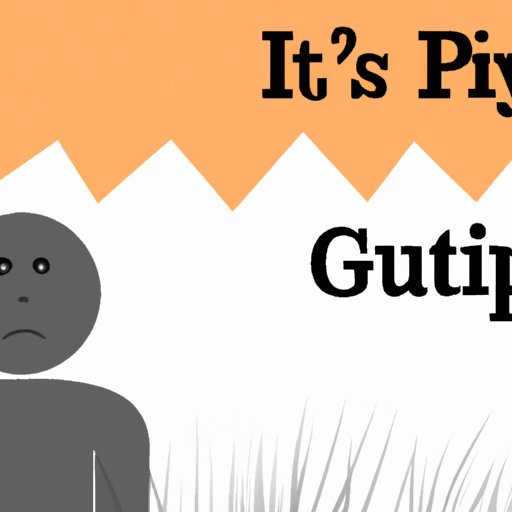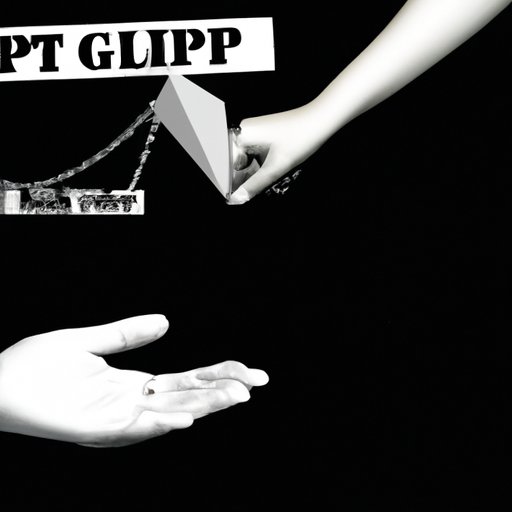Introduction
Have you ever been on the receiving end of a guilt trip? If so, you know how uncomfortable it can be. But what is a guilt trip, exactly? A guilt trip is an attempt to make someone feel guilty or ashamed in order to manipulate them into doing something they wouldn’t normally do. In this article, we will explore the definition of a guilt trip, the pros and cons of using them, the psychology behind them, how to identify and respond to them, and how guilt trips can be used as a form of manipulation.
A Guilt Trip Explained: What It Is and How to Avoid It
At its core, a guilt trip is a type of manipulation. According to psychologist Dr. Carla Marie Manly, “Guilt trips are a form of passive-aggressive behavior designed to control another person’s actions.” The goal is to make someone feel guilty or ashamed in order to manipulate them into doing something they wouldn’t normally do. This could include anything from agreeing to do a favor to giving up something that belongs to them.
The key to avoiding a guilt trip is to recognize the signs of one. Common signs include manipulative language (e.g., “If you really loved me, you would…”), veiled threats (e.g., “You don’t want to make me angry, do you?”), and exaggerated statements (e.g., “I can’t believe you would do this to me!”). If you see any of these red flags, it’s important to stay calm and stand your ground. Don’t let the other person’s words or actions influence your decision; remember, you have the right to say no without feeling guilty.

The Pros and Cons of Guilt Trips: When to Use and When to Avoid
While guilt trips are generally seen as negative, there are some situations in which they can be beneficial. For example, if your friend is struggling with an addiction, a guilt trip may be the incentive they need to seek help. Similarly, if your child is refusing to do their chores, a guilt trip can be an effective way to motivate them to get the job done.
On the other hand, guilt trips can also be extremely damaging. Research shows that guilt trips can lead to feelings of anger, resentment, and low self-esteem. They can also create an unhealthy dynamic in relationships, as people start to rely on guilt trips to get what they want. For these reasons, it’s important to think carefully before using a guilt trip, and to avoid them whenever possible.

Guilt Trips 101: Understanding the Psychology Behind Them
To understand why guilt trips are so effective, it’s helpful to look at the psychology behind them. According to research, guilt trips are often rooted in childhood experiences. People who experienced criticism, neglect, or abandonment as children may be more likely to use guilt trips as adults, as a way of trying to control or manipulate others. Furthermore, guilt is an emotion that is deeply ingrained in many cultures, making guilt trips an effective tool for getting what you want.
It’s also important to consider the emotional impact of guilt trips. While guilt trips may seem like a harmless way to get someone to do something, they can have long-lasting effects. People who are on the receiving end of a guilt trip may experience feelings of shame, inadequacy, and helplessness, all of which can take a toll on their mental health.
How to Identify a Guilt Trip and Respond Appropriately
The best way to protect yourself from a guilt trip is to recognize the signs. Common signs include manipulative language, veiled threats, and exaggerated statements. If you sense that someone is attempting to manipulate you, it’s important to remain calm and stand your ground. Let the other person know that you will not be swayed by their tactics, and politely explain why you cannot do what they are asking.
It’s also important to remember that it’s okay to say no. You have the right to make decisions based on what is best for you, and you don’t have to feel guilty about it. If you find yourself feeling overwhelmed or overwhelmed by someone’s guilt trip, take a step back and remind yourself that you are in control of your own life.

Guilt Trips as a Form of Manipulation: Why They Can Be Harmful
While guilt trips can be beneficial in some cases, they can also be a form of manipulation. In some cases, guilt trips may be used to make someone feel guilty for not living up to someone else’s expectations. This type of manipulation can be especially harmful for children, as it can lead to feelings of insecurity and low self-esteem.
Furthermore, guilt trips can be used to manipulate someone into doing something they don’t want to do. This type of manipulation can be especially damaging, as it can lead to feelings of powerlessness and resentment. It can also cause people to question their own worth, which can have a long-term negative impact on their mental health.
Conclusion
In conclusion, guilt trips can be a powerful tool for getting what you want, but they can also be a form of manipulation that can cause lasting damage. It’s important to recognize the signs of a guilt trip and respond appropriately. Additionally, it’s important to understand the psychology behind guilt trips and the emotional impact they can have. By understanding these things, you can better protect yourself from being manipulated by guilt trips.
Ultimately, guilt trips can be used to motivate people to do something they wouldn’t normally do, but they should be used sparingly and with caution. With awareness and understanding, you can learn to recognize when someone is attempting to manipulate you with guilt, and you can respond in a way that is respectful and empowering.
(Note: Is this article not meeting your expectations? Do you have knowledge or insights to share? Unlock new opportunities and expand your reach by joining our authors team. Click Registration to join us and share your expertise with our readers.)
